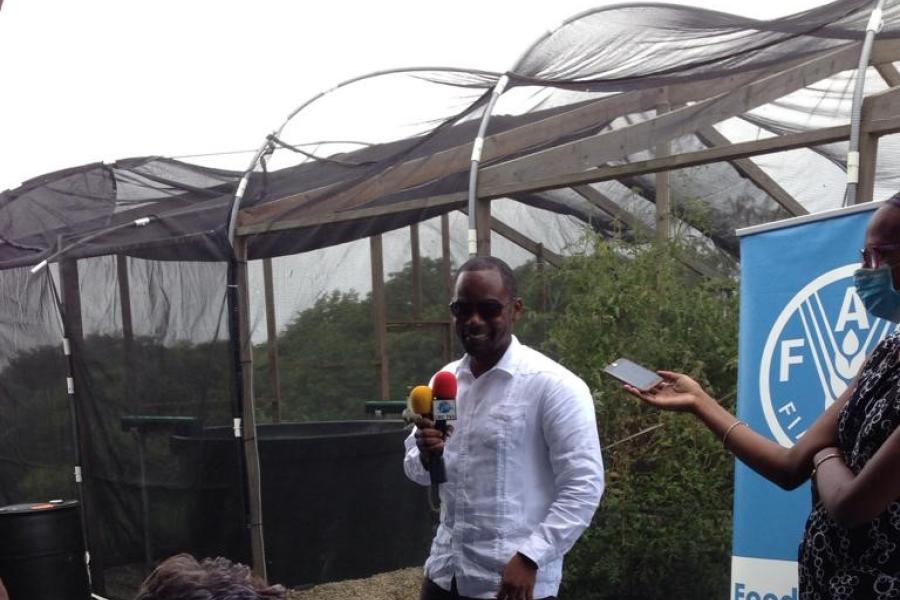Barbados will soon get its first ever Aquaponics Demonstration Farm
26 October 2019
- The Ministry of Maritime Affairs and the Blue Economy in Barbados and The Food and Agriculture Organization of the United Nations (FAO) in collaboration with Adams Aquafarm are officially launching the first Aquaponics Demonstration Farm in Barbados.

Barbados will soon hook up its own Aquaponics Demonstration Farm at Adams Aquafarm thanks to the collaborative efforts of Ministry of Maritime Affairs and the Blue Economy in Barbados and The Food and Agriculture Organization of the United Nations (FAO). The demonstration farm will be officially launched at Adams Aquafarm in Hopewell, St Thomas on Friday 24 July 2020 at 10 am.
Aquaponics is the integration of land based fish farming (aquaculture) and soil-less plant production (hydroponics) with the fish waste providing nutrients for the plants, while the bacteria and plants helps to clean the water for the fish.
As part of the FAO’s Blue Revolution project, Adams Aquafarm received funding and training to develop a demonstration farm in collaboration with the Ministry of Maritime Affairs and the Blue Economy which has now been built. The funding also supports the training of 30 entrepreneurs with a 5 day training (class room and hands-on) who are interested in developing an aquaponics small or medium sized business in Barbados. The first training of 10 participants took place pre-COVID, now the project will have its launch and the continuation of the training and launch of the project.
Renata Clarke, FAO’s Sub-regional Co-ordinator stated, “The Blue Revolution project supports local food security as aquaponics can grow a tremendous amount of food with a fraction of the water that is normally used in soil based agriculture while using no chemicals. At the same time food can be grown directly in local communities, providing access to safe and nutritious food, creating jobs and reducing the huge carbon footprint associated with food transportation miles”.
This project also supports aquaponics training for to 10 schoolteachers in Barbados. Globally aquaponics is a popular educational tool as it provides a concrete example for core STEM subjects like Math, Biology, Chemistry and Engineering. Students can study fish, plants and bacteria interacting in a living ecosystem. Students can perform water quality tests and measure and track growth rates in fish and plants while learning about topics such as economics, marketing and nutrition.
The Honorable Kirk Humphrey, Minister of Maritime Affairs and the Blue Economy stressed, “This project provides great benefits to the country of Barbados as it support new and innovative farming opportunities for small-scale and medium sized businesses. At the same time it provides an attractive opportunity for the youth and recent graduates as it can incorporate high-tech farming tools and addresses sustainability concerns from both the aquaculture and agriculture sectors”.
This Blue Revolution project is part of a larger effort of FAO to support aquaculture development in the Caribbean. Under the project and the Climate Change Adaptation of the Eastern Caribbean Fisheries Sector Project (CC4FISH), FAO is funding demonstration farms across the Caribbean and continues to promote the adoption of aquaponics techniques and capacity building exercises in the region. Technical and business oriented workshops have been planned across the region in order to promote the establishment and success of aquaponics enterprises.
Kristina Adams, owner of Adams Aquafarm owner stated “The Aquaponics farm funded through FAO has allowed me to showcase a farming system that is 100% suited to Barbados while utilizing local supplies and advanced technology to grow local products. It is a great opportunity for farmers and young people who wish to move forward with an innovative and productive form of agriculture.” The farm currently produces tilapia, specialty lettuces, sweet peppers, tomatoes and a wide range of herbs.
Iris Monnereau, Regional Project Coordinator at FAO of CC4FISH stated, “Aquaponics has several advantages as neither drought nor torrential rains impact an aquaponics farm. It also uses significantly less water than traditional agriculture since most of it is recycled and requires only a third of the space that traditional farming needs. With the expected decreases in precipitation, this system will support more climate change resilient farming. With the expected spin off aquaponics farms in Barbados this project can support a reduction of the food import bill, create employment, while also supporting youth engagement in agriculture”.







